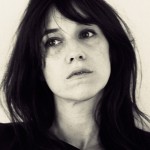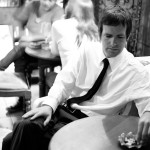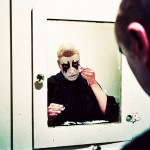Throughout his nearly 40-year career, Boyd Rice has been called a misanthropic nihilist, a card-carrying Satanist and even a Wolfsangel-wrapped fascist. As one of the highest ranking officials in Anton LaVey’s original Church of Satan, he can’t possibly avoid that second point, but the rest, well…
“My job is putting stuff out there, and if people understand it, great,†says Rice, as we chat at the apartment of his longtime friend and collaborator Bryin Dall (Hirsute Pursuit, Thee Majesty). “If they don’t, I can’t be bothered. It’s their problem, not mine.â€
But even when you think you understand Rice’s dark-ambient diatribes and his influential noise-industrial project NON–records whose ripples can be felt everywhere from Wolf Eyes to Cold Cave– odds are you’re only half right. Take the first time we saw Rice live. From the videos casting his set in shadows and soot to the music itself’s militaristic melodies, the act didn’t feel like a concert; it felt like performance art.
And yet, Rice insists with a smile, “If I was going for a performance-art piece, I would have taken off my clothes and smeared something disgusting on my body. That’s performance art.â€
So just who is Boyd Rice? A button-pushing prankster? A life-long provocateur? The devil in disguise? We’re about to find out…
Read the first half of this interview here.
There was a big gap between your last two records. What were you doing during that break?
I wanted to do an entire album where I’d direct these singers from Catholic choirs that I know. I wanted to sample their voices and create this operatic thing. But then one of the girls’ parents looked me up online and said, ‘I don’t want you to have anything to do with this guy. He’s the leader of a sex cult.’ I had about four girls who were singers, and within a few weeks, none of them were able to work with me anymore.
[Back to Mono] formed organically when I was hanging out with [Cold Cave frontman] Wes [Eisold] in Philadelphia…The last thing I did about 10 years ago was pretty orchestral and classical, so I wanted to do something totally different. People still send me tons of noise music, and the stuff they’re sending me now sounds just like what they’d send me in 1981, except they’re using more sophisticated technology. So I thought it’d be fun to do that again. And it was.
Do you feel a need to remind people of the pioneering work you’ve done in this genre?
It’s credit where credit is due. When people thought punk rock was groundbreaking, I thought bullshit.
Why is that? Because it felt like a uniform?
The Sex Pistols seemed like the Monkeys to me, where someone said, ‘Hey, go get a haircut that’s a cross between Ziggy Stardust and Richard Hell.’ I wanted to be excited by it, but I just wasn’t. When all of these angry young men were saying, ‘We want to tear the world down and burn it,’ I thought, ‘Us guys are actually kinda doing that.’ These people are using the same three or four chords that go back to Chuck Berry. Maybe some keyboards if you’re lucky. I never had a single record by the Sex Pistols, the Clash or the Jam.
Going back to the problems you had with that choral record, is part of you proud that you’ve created this mystique around your work, while another part is frustrated over how that can keep you from actually getting things done?
It’s a two-edged blade. On one level, some of this draws attention to what I do, but at the same time, some of it overwhelms the content of what I do. I’m sure if I didn’t have this bad reputation, there’d be a lot of critics who’d say, ‘Oh this guy is an important figure.’ At the same time, there’s kids who get off on this transgressive stuff and like that aspect of it. I don’t know.
One thing we haven’t talked about is your relationship with Mute. You’re their longest-running artist, aren’t you?
I’m the first person they signed, yeah…I went into [Rough Trade] to sell them copies of my Black Album and this girl behind the counter played me all of these records. Literally minutes after I bought “Warm Leatherette,” Daniel Miller came in and this girl said, ‘Hey Daniel, this guy just bought your record and makes weird music too.’ So we started talking, and I recorded a couple of things at his house. When I was about to leave for the airport, he called and said, ‘My single is doing well. If it continues to do well, I’m thinking of starting my own label. Would you like me to release your record here in England?’ And I said, ‘Yeah, of course.’ That was that.
What’s kept you working with them for so many years?
I think Daniel understands me. He understood me back in the ’70s, and he understands me still. I’m never going to sell as many records as some of the other artists on the label, but I sometimes think I’m a good luck charm.
Do you keep up with what they put out?
Some of it, like I did a remix for Liars. They give me tons and tons of stuff, but I don’t listen to a lot of music these days.
What are you doing instead?
[Laughs] That’s a good question. I wonder that myself sometimes.
Have you been doing a lot of writing that’s gone unpublished?
[In a hushed voice] There’s a [ton] of writing I’ve done, yeah.
So what are you looking to do with that? This is an age where you can put it all out yourself, after all.
I’m thinking of doing that. Daniel has tried to get me to put out everything I’ve done as E-books. But I’m an old dinosaur; if I write a book, I want it to be a thing people sit down and hold it in their hands. A book, you know?
But if you make all of your writing available as E-books, people like those opera singers could read it without getting in trouble with their parents.
[Laughs] Well the convenience of it makes sense.
I’ve gotta ask about your time with Anton LaVey. How did you even get a hold of that guy?
I was involved in a film festival that was related to a book I’d done with Jim Morton called Incredibly Strange Films, and he came to that. He knew about me through the RE/Search books, so we met and as the film started, he said, ‘Give me your information and I’ll have my gal Blanche [Barton] give you a call to come over to the house.’ I thought, ‘Yeah, this is never gonna happen.’ But a couple days later, she called and said, ‘What’s the best time for you?’ So I went there on my day off, and every week after that–sometimes several times a week–until I left San Francisco.
So how many years was that going on?
Several years.
What was it like going to his house? Did you have to pass by a lion before meeting him?
No, I had to pass by a dog that was part wolf, part German Shepherd. The door would open up and she’d have this thing on a leash. It’d be on its hind feet going [barks uncontrollably]. She’d go, ‘Silent, Bathory, silent.’
So what happened after that?
I’m sitting in this empty room, waiting and waiting while Blanche is off making coffee. And then the fireplace swings forward and LaVey is crawling through a hole in the floor. He’s crawling on his elbows and missing some teeth, so he really looks like some feral beast. He gets out of that, stands up and says [in a strange voice], ‘Boyd, thank you for coming!’
I don’t even know what to say to that.
Well, I’m really lucky because I got to know him and Tiny Tim. These figures I grew up on became people who would call me late at night and have these long discussions. I feel like I’ve lived a very privileged life. How many people get to meet all of their favorite heroes and pop culture figures?
Did you and Anton hit it off on a personal level, where you got to see a side of him very few people had?
Absolutely. So many of the things he loved–like girl groups and Tiny Tim–were things I loved.
What’s the fascination with Tiny Tim?
He’s like an ecologist preserving all of these songs from the 1890s and 1910–one of those people where you’re in an alternate universe whenever you’re in the room with him. And you never want to leave that universe.
You ended up interviewing him too right?
Yeah, he played this show in Denver. I just showed up at the venue and said, ‘I work at this local music magazine; can I interview you?’ He was so amazed that I knew everything about him. Most people thought of him as this campy figure from the ’60s, but I knew his whole background story.
It sounds like you should stop doing music and became a journalist full-time.
I could, although a lot of people I want to write about are dead now.
Like who?
I would have liked to meet Jean Cocteau. And I came very close to meeting Vampira. While she’s not someone I was obsessed with, I drove my friend Johanna Went, the performance artist, to her house once and I said, ‘Please, can I come in and meet her?’ And she said, ‘Oh, she doesn’t really like people. Maybe if I tell her about you, next time you could come in.’ That never happened.
I don’t want to dwell on Anton, but how much time passed between when you met him and when he asked you to be involved with the Church?
It was instantaneous practically. After a number of meetings, he kinda said, ‘Boyd, you seem like a really Satanic guy. Here’s a membership card.’ And I thought, ‘Oh great, thank you.’
Was it at least laminated?
Nah, it was a little red card with his signature and a baphomet on it. He gave me a baphomet medallion at the same time, and then later, he said, ‘You should be a priest in the Church of Satan.’ So I said okay, and then he said, ‘Now you’re a member of the Council of Nine,’ which is supposed to be the ruling body of the Church of Satan. And ultimately he made me the Grand Master of the Order of the Trapezoid.
I assume that’s even more prestigious than the Council of Nine.
Yeah [laughs]. The Order of the Trapezoid existed before the Church of Satan, but then another occult group was trying to hijack the Order of the Trapezoid. So in order to keep them from doing that, he made me the Grand Master of it.
Did being around that environment in person, rather than just by reading a book, strengthen your beliefs? Or did it make it seem less real? Because sometimes you meet your heroes and it shatters the illusion of them.
Oh no, nothing about knowing Anton LaVey disillusioned me on any level. It was one of the best experiences of my entire life.
How do you feel about the Church now that he’s not around?
Well my allegiance was always to him, not the organization. I don’t have any allegiance to the people who say they’re following in his footsteps. I feel a compunction to speak out against them from time to time because I feel like they are misrepresenting what he was doing. They’re trying to make it some sort of rationalist movement. He wasn’t into rationalism; he was into mysticism.
You have this reputation as a total misanthrope. Has that changed at all as you’ve gotten older?
Not really, although I’m engaged to be married [laughs].
You swore you’d never get married all these years. What did she do to change your mind?
Well we’ve been together for three years. When we went out for our third anniversary, I asked her in a roundabout way. In the past, I’ve been able to be with a person for six months, then forget about it. But we’ve been together for three years and we haven’t had a single argument. She’s amazing. If you could marry Ann Margaret and she’s also a gourmet chef, would you think twice about it?
Probably not. Why have most people not been able to make it past three months with you?
When you’re somewhat of a public figure, people think they know what you’re into, and they try to cater everything to that. And they can keep up that facade for six months, but after six months–almost to the day–they act like the complete opposite. It’s like what you see is what you get. I’m not going to change for anyone…Don’t date a guy who’s always drinking 24/7, then suddenly say ‘I think you drink too much’ after six months…It’s not too much if it helps you deal with the world. I’m not on Klonopin, you know? I’ve love to be on Klonopin.
Why aren’t you then?
I will be soon, after I’m married. I used to talk to John Balance of Coil, and early on, he said his situation with drinking and drugs is this Arthur Rimbaud-like detachment of the senses. And the last time I talked to him, he said, ‘Truthfully Boyd, I hate this world so much that if I weren’t drinking non-stop, I would not be able to deal with it.’ I thought, ‘Okay, I dig that.’
That’s how you feel too then?
To a certain extent. After the album came out, I tried to be more engaged with people on my Facebook page. But once I got back from touring Europe, I couldn’t look at my computer without shuddering. I couldn’t take one more human voice in my head. You know, my life is so perfect, but every time I interact with a lot of people, it’s like every extra one takes away from the perfection.
The flipside to that is the best thing in the world is other people–people you can truly cherish. That’s something special, something you can take with you…I don’t think I’m as much of a misanthrope as I used to be, but it’s just hardwired into me by now. I keep everything at arm’s length to whatever extent I can.
What bothers you about most people though?
Everything. Like when you go into the subway, it’s just throngs and throngs of people.
It’s good you never moved to New York. If you had, you might have ended up being a criminal after all.
Well, my girlfriend and I wanted to move back here a few years ago because there’s lots of great people and opportunities here. But I can only move back when I have enough money to take a cab everywhere. And even that’s problematic, because then you’re stuck in traffic.
Do people simply make you anxious?
No, I feel comfortable with people. Especially the people who come to my shows; they’re all intelligent, good-looking and well-dressed, you know? So having people come up to me and ask about girl groups or Tiny Tim doesn’t bother me at all.
Well you’re also fortunate that you were never a trendy artist. If someone comes to your show, you know they have a good reason to be there and genuinely like you.
I’ve been able to maintain a long career because I’ve never been successful. That’s the quickest way to kill a career–success. Because when you’re a cult figure and people are coming around because they really love your stuff, it’s great.
I’m guessing the person you’re marrying wasn’t a fan first.
She knew who I was because her first big love was this guy who was into industrial music and he really liked me…We met in a hot tub at a friend’s wedding. It was at the Madonna Inn, which is like a cross between a hotel and Disney World. I was staying in the caveman suite, which is the coolest room in the whole place. But yeah, we met in a hot tub and just hit it off.
I hadn’t had a really serious relationship for 12 years before that. I kinda thought I was done with this relationship thing.
Have you found it hard to trust women because of the book that damaged your reputation so much?
I found it hard to trust women even before then. [Laughs] No, I’m happy about that book. She told so many lies about me that she thought I was going to track her down and kill her. So after it came out, she was gone from my life. That’s been a blessing from god–not having to get the constant phone calls from her.
Are you in touch with your kid though?
No, she cut off all contact with me. I used to see him a few times a year before that.
Is that the one regret you have? Not having a relationship with him?
I don’t know if I have any regrets about anything.
–
‘Back to Mono’ is available now on Mute Records.






